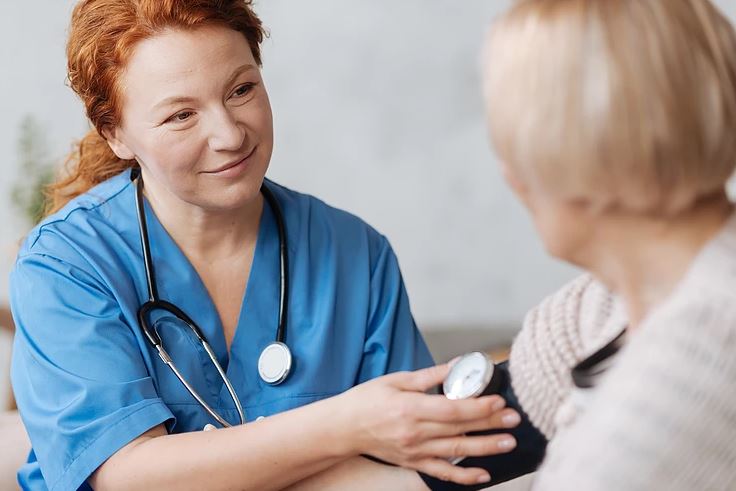1 in every 3 American adults suffer from high blood pressure (or HBP). But what you really need to know is how to lower your blood pressure! High blood pressure increases your risk for stroke and heart disease, which are both in the top 3 leading causes of death. But what is high blood pressure or hypertension? What causes it? And how do I lower it?
What is Blood Pressure?
The American Heart Association defines blood pressure as “the force of blood pushing against blood vessel walls.” Meaning that the top number (or systolic number) happens when blood pumps out of the heart and the bottom number or (diastolic number) happens as the heart rests between beats. High blood pressure is when the blood pushing against the walls is consistently too high.
What Causes High Blood Pressure?
Although there is no specific cause leading to increased HBP there are a few factors that can increase your risk. Family history has a big correlation so if a family member has high blood pressure there’s an increased chance that you will develop it too. Other risk factors include smoking, obesity or being overweight, increased salt intake, and even certain conditions such as diabetes and chronic kidney disease.
How Do I Know If I Have High Blood Pressure?
Since you can develop HBP without any symptoms, it can go years untreated. This is why you need to check your blood pressure as well as visit your primary care provider regularly in order to ensure you’re keeping it under control. Our favorite way to do this is with an automatic BP monitor that records the readings, like this one! It can hold 200 readings, 2 users, and has bluetooth so that you can access the data from your smartphone. That way the information is in the palm of your hand when you visit your PCP.
What To Do If You HAVE High Blood Pressure
If you have HBP then you should start by seeing your primary care provider (or PCP). HBP should not be left untreated. Depending on the severity they may place you on a medication to lower your HBP and get it under control. Listen to your medical professional’s advice but know that diet and exercise are directly related to lowering BP. A good primary care provider will recommend lifestyle changes prior to immediately placing you on a medication. For many of you it may have already been a conversation that you have had.
Addition of Exercise
The thing about the phrase “lifestyle change” is that it scares people…specifically the life part. When you hear your MD say lifestyle change you know you will have to change your diet and exercise regularly. Well what you may not realize about that BP medication is that it is also for life. Once on a BP medicine you cannot make changes or reduce your dose without discussing with your PCP first. So don’t think that we’re recommending throwing out the medicine if you’re already on one, but do realize that a lifestyle change is beneficial to not only your blood pressure. See the many benefits of a healthy lifestyle here.
Here’s what we are saying. Losing even just a few pounds can reduce your blood pressure which could make it possible for your PCP to recommend lowering the BP medication you are on. Again, this is why regular checkups are important. But now imagine if you lost 20lbs? And maybe you don’t have 20lbs to lose but you know your diet and exercise aren’t where they need to be. Get on that!
Most importantly is this: the number 1 recommended change to reduce your blood pressure is diet and exercise. Check out this article for more encouragement on why you need to get moving and the many benefits of exercise. We all know there are benefits to exercise but it can be hard to get started. Regular exercise is crucial to overall improved health and reduced risk for HBP among many other benefits.
Focusing on a Balanced Diet
Exercise is a huge part of lowering your BP but so is a balanced diet. The diet you should be considering is known as the DASH diet or Dietary Approaches to Stop Hypertension. The main focus of DASH is having balanced meals filled with fruits, vegetables, and low fat dairy as well as mild amount of whole grains, fish, poultry, and nuts. DASH also recommends limiting alcohol and caffeine intake. Check out one of our favorite resources for the DASH Diet. A 28 day DASH Diet complete with super tasty recipes and workouts focused on helping you lower your blood pressure. Seriously, check it out!
How Long Does It Take?
On average if you start eating better and exercising regularly you should notice a change in your blood pressure in just a couple weeks. Overall for significant improvements it will be more like a few months. But note that if you stop exercising and eating right then your BP will likely go back up. Just like medication, it’s only effective when you’re taking it as prescribed.
Previously high blood pressure was defined as 140/90 and above. The guidelines were changed in November 2018 to HBP being defined as 130/80. This means that what previously would have been passed up in a regular checkup may now be more of a red flag for general heart health. When scheduling your next appointment be sure to keep this in mind as years of untreated HBP can be deadly.
The information you need…Straight Up!

